Navigation
Install the app
How to install the app on iOS
Follow along with the video below to see how to install our site as a web app on your home screen.

Note: This feature currently requires accessing the site using the built-in Safari browser.
More options
You are using an out of date browser. It may not display this or other websites correctly.
You should upgrade or use an alternative browser.
You should upgrade or use an alternative browser.
World Refugee Day
- Thread starter Unkotare
- Start date
Granny says, "Dat's right - Obama lettin' `em overrun us with jihadis...

Number of Syrian Refugees in US Doubled Last Month
July 03, 2016 - The number of Syrian refugees who entered the United States in June more than doubled over the previous month, putting President Barack Obama's goal of resettling 10,000 by the end of the fiscal year on September 30 within reach.
Number of Syrian Refugees in US Doubled Last Month
July 03, 2016 - The number of Syrian refugees who entered the United States in June more than doubled over the previous month, putting President Barack Obama's goal of resettling 10,000 by the end of the fiscal year on September 30 within reach.
The U.S. State Department's Refugee Processing Center reports 2,381 Syrian refugees arrived in the U.S. last month. They settled in 38 states, mostly in Michigan (570), California (500), Arizona (388), Illinois (343), Pennsylvania (340), Texas (321) and Florida (301). To meet the administration's goal, the United States must welcome 4,814 Syrian refugees during the next three months.
Since the start of the Syrian civil war in 2011, 4.1 million Syrians have fled the country, according to the Council on Foreign Relations. Many have settled in the neighboring countries of Jordan, Lebanon and Turkey. The war has contributed to the refugee crisis in Europe, which had taken in about 1 million Syrians in 2015.
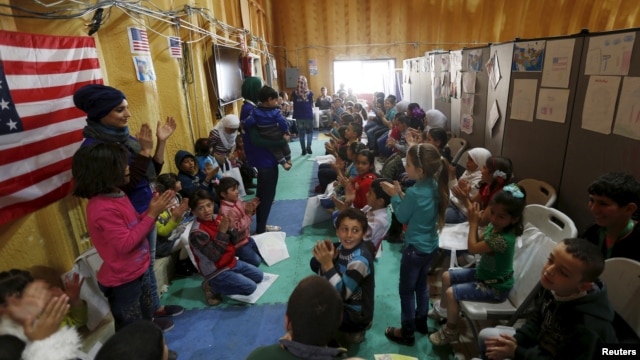
Syrian refugee children play as they wait with their families to register at the U.S. processing center for Syrian refugees, during a media tour held by the U.S. Embassy in Jordan, in Amman, Jordan
The humanitarian crisis created by the war prompted Obama to call for a significant increase in the resettlement of Syrians in the United States. But efforts to accommodate them have been plagued by terror fears and congressional efforts to block the program. The latest figures, though, significantly increase the likelihood that the administration's goal will be attained.
Meanwhile, there appears to be ample public support in the United States for Syrian refugees. A Brookings Institution poll released in mid-June found that most Americans, 59 percent, favored admitting refugees from Syria in particular and from other Middle Eastern countries.
Number of Syrian Refugees in US Doubled Last Month
Gee, after the rapefest in Cologne, any wonder why European opinions are changing?...

Europeans fear refugees will lead to more terrorism, fewer jobs, poll shows
July 12, 2016 -- Most Europeans believe the flood of Muslims into Europe will lead to an increase in terrorism and a bigger economic burden, according to a new Pew Research Center survey. The survey results, published on Monday, showed 59 percent polled in 10 European countries -- accounting for 80 percent of the EU population -- believe the influx will lead to more terrorism.
See also:
Austria seizing home where Hitler was born; may turn it into refugee center
July 12, 2016 -- Austria's cabinet approved plans to expropriate the Braunau am Inn, Austria, house in which Adolf Hitler was born.
Europeans fear refugees will lead to more terrorism, fewer jobs, poll shows
July 12, 2016 -- Most Europeans believe the flood of Muslims into Europe will lead to an increase in terrorism and a bigger economic burden, according to a new Pew Research Center survey. The survey results, published on Monday, showed 59 percent polled in 10 European countries -- accounting for 80 percent of the EU population -- believe the influx will lead to more terrorism.
In Hungary it was 76 percent, followed by Poland at 71 percent; Netherlands at 61 percent; Germany at 61 percent; Italy at 60 percent; Sweden at 57 percent, Greece at 55 percent, United Kingdom, 52 percent; France at 46 percent and Spain at 40 percent. Europeans also said in the survey they were concerned about an economic burden, with the majority in five nations saying refugees will take away jobs and social benefits from the native-born population: Hungary (82 percent), Poland (75 percent), Greece (72), Italy (65), France (53). Overall, 50 percent of respondents among the 10 nations said they agreed that refugees will take away jobs and benefits. The other percentages were United Kingdom (46), Netherlands (44), Spain (40), Sweden (32) and Germany (31). Most recent refugees to Europe are arriving from majority-Muslim nations such as Syria, Iraq, Afghanistan, Eritrea and Somalia.
Germany took in more than 1 million refugees last year. German Chancellor Angela Merkel this week admitted many terrorists had infiltrated Europe disguised as refugees. "In part, the refugee flow was even used to smuggle terrorists," she said, addressing supporters of her Christian Democrat Union party on Monday. The poll showed most people in four countries have negative opinions about Muslims: Hungary (72 percent), Italy (69), Poland (66) and Greece (65). Then it follows with Spain (50), Netherlands (35), Sweden (35), France (29), Germany (29) and United Kingdom (28). Some of these views are linked to a belief that Muslims do not wish to participate in broader society. Overall, 58 percent say Muslims want to be distinct.
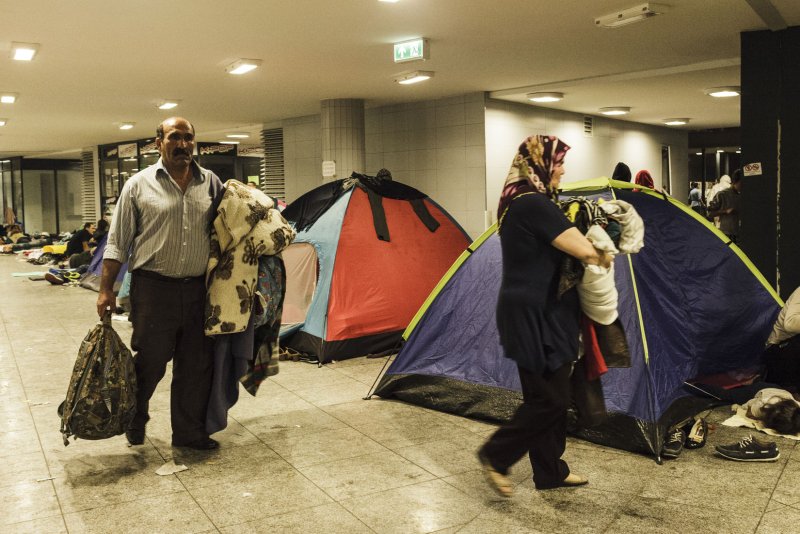
The strongest views are in Greece (78 percent), followed by Hungary (76), Spain (68), Italy (61), Germany (61), United Kingdom (54), Netherlands (53), France (52), Sweden (50) and Poland (45). The percentage has declined since 2005 in four of five countries where trend data is available. The biggest drop has been in Germany from 88 percent in 2005. Muslims weren't the only minority group viewed unfavorably by many Europeans. Across the 10 nations polled, a median of 48 percent had an unfavorable opinion of Roma (Gypsies) in their country. A total of 82 percent hold this view in Italy followed by Greece (67), Hungary (64) and France (61). The lowest was Netherlands at 37 percent.
Only 16 percent have an unfavorable opinion of Jews in their country. Nations with the most unfavorable view were Greece (55 percent), Hungary (32), Italy (24) and Poland (24). The least negative was Netherlands at 4 percent. The Pew Research Center conducted the phone survey in 10 European Union nations and the United States, surveying 11,494 people from April 4 to May 12 before the Brexit referendum in the UK and terrorist attacks at the Istanbul Ataturk Airport, both of which took place in late June. The latest report did not include information from the United States on attitudes toward Muslims.
Europeans fear refugees will lead to more terrorism, fewer jobs, poll shows
See also:
Austria seizing home where Hitler was born; may turn it into refugee center
July 12, 2016 -- Austria's cabinet approved plans to expropriate the Braunau am Inn, Austria, house in which Adolf Hitler was born.
The house, near the German border, was leased by the government from a private owner until 2011, when the owner refused permission for renovations. It had been used as a center for people with disabilities, but now stands empty. Talks between the owner and the government, over new uses for the rented property, stalled and the owner has refused to sell the building. Hitler was born in the house in 1889.
Seizing the house is "the worst and the last choice, but there are circumstances in which it becomes necessary,' said Harry Buchmayr, the area's representative in parliament. It also comes with the reminder that Austria has an obligation, declared in its constitution, to prevent any re-occurrence of Nazism, and confiscating the house means the Austrian government, fearing it could become a magnet for neo-Nazi groups, must decide what to do with the property.
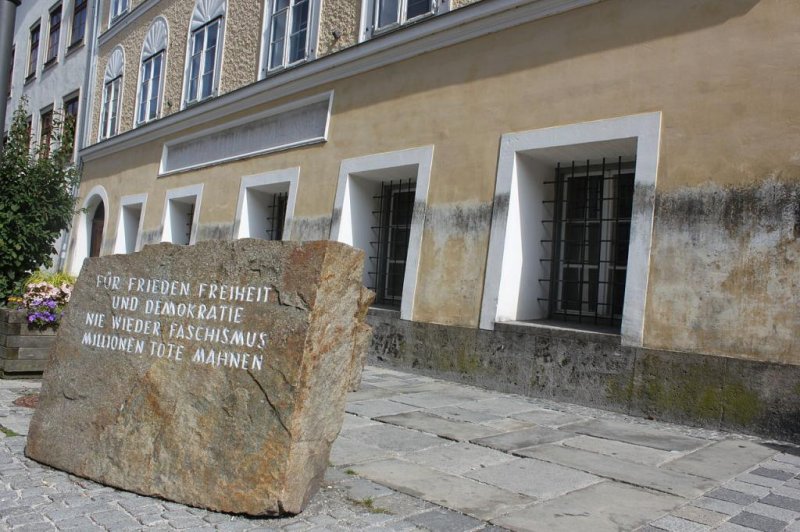
Hitler's old home
There have been several proposals for the home. Some of Braunau am Inn's 17,000 residents support using it as a refugee center. Other proposals are for an Austrian liberation museum, a maternity hospital or a meeting place for scholars. Some residents, however, want to see the home demolished.
Gerhard Baumgartner of the Documentation Center of Austrian Resistance, a clearinghouse of far-right and fascist activity information, suggested it become a fire house or supermarket. He told the Vienna-based newspaper Die Presse, "You must completely depoliticize the place. You must put up something that no one wants to be photographed in front of. I don't think you have to tear down the old house, The Local reported Tuesday.
Austria seizing home where Hitler was born; may turn it into refugee center
Last edited:
- Aug 16, 2011
- 127,813
- 24,079
- 2,180
- Thread starter
- #5
Return to they're [sic] homeland...return?...
That is what many refugees want most of all.
Have you ever worked with, or even met, any refugees?
Last edited:
Some neighboring countries not carryin' their fair share of the load...

6 wealthiest countries host less than 9 percent of world's refugees
July 18, 2016 - The six wealthiest countries host less than 9 percent of the world’s refugees, an Oxfam analysis shows.

6 wealthiest countries host less than 9 percent of world's refugees
July 18, 2016 - The six wealthiest countries host less than 9 percent of the world’s refugees, an Oxfam analysis shows.
Jordan, Turkey, Pakistan, Lebanon, South Africa and the Occupied Palestinian Territory host more than 50 percent of the world’s refugees and asylum seekers but account for under 2 percent of the world’s economy. Collectively, the United States, China, Japan, Germany, France and the United Kingdom hosted 2.1 million refugees and asylum seekers last year — just 8.88 percent of the world total. Germany recently welcomed far more refugees than the other richest nations, yet a major gap remains with poorer countries providing the vast majority of safe havens for refugees.
Ahead of two major summits about refugees and migrants in New York in September, Oxfam called on governments to host more people in need of safe havens and commit to do more to help the developing countries sheltering the majority of refugees. “It is shameful so many governments are turning their backs on the suffering of millions of vulnerable people who have fled their homes and are often risking their lives to reach safety," Winnie Byanyima, executive director of Oxfam International said. "Poorer countries are shouldering the duty of protecting refugees when it should be a shared responsibility, but many richer countries are doing next to nothing." "The international displacement we are seeing is an unprecedented and complex challenge requiring a coordinated global response," she added. "The richest countries need to be part of the solution and do their fair share by welcoming and protecting more refugees."

More than 65 million people have fled their homes because of conflict, persecution and violence; the highest level since records began. A third of these people are refugees and asylum seekers, while the majority have been internally displaced. The conflict in Syria has been a major factor, but people are also fleeing violence in South Sudan, Burundi, Iraq and Yemen and elsewhere.
This is happening as the mood for offering safe havens to people on the move is darkening. The recent deal between European governments and Turkey left thousands of people detained in Greece in often appalling conditions and legal limbo. The Kenyan government, when announcing the closure of the Dadaab refugee camp, said that if Europe could turn away Syrians, Kenya could do the same for Somalis. "Too many people who have taken treacherous journeys to reach safety end up living in degrading situations littered with abuse, hostility and discrimination and too few governments are doing anywhere near enough to help or protect them."
6 wealthiest countries host less than 9 percent of refugees
- Aug 16, 2011
- 127,813
- 24,079
- 2,180
- Thread starter
- #7
Return to they're homeland...return?...lmfao, wow uncle terrie. How remarkably ignorant. You embarrass me.
Hey windbag, have you ever actually met a refugee or asylum seeker?
StLucieBengal
Gold Member
Return to they're homeland...return?...lmfao, wow uncle terrie. How remarkably ignorant. You embarrass me.
Hey windbag, have you ever actually met a refugee or asylum seeker?
Not sure about that guy but I have.....
refugees shouldn't be leaving their continents.
- Aug 16, 2011
- 127,813
- 24,079
- 2,180
- Thread starter
- #9
......
refugees shouldn't be leaving their continents.
Under better circumstances, almost all would rather not.
Liberty777
Silver Member
- Mar 9, 2016
- 1,036
- 84
- 95
They should have never leftJune 20. Whatever else you think about related issues, we should all hope refugees can return to their homelands as soon as possible.
- Aug 16, 2011
- 127,813
- 24,079
- 2,180
- Thread starter
- #12
They should have never leftJune 20. Whatever else you think about related issues, we should all hope refugees can return to their homelands as soon as possible.
It is not what they would have chosen under normal circumstances, genius.
--------------------------- I have said it before , the Dripper is one of the refugee invaders advocates as he and mrobama work to get murderous muslims into the USA .Return to they're [sic] homeland...return?...
That is what many refugees want most of all.
Have you ever worked with, or even met, any refugees?
- Aug 16, 2011
- 127,813
- 24,079
- 2,180
- Thread starter
- #14
--------------------------- I have said it before , the Dripper is one of the refugee invaders advocates as he and mrobama work to get murderous muslims into the USA .Return to they're [sic] homeland...return?...
That is what many refugees want most of all.
Have you ever worked with, or even met, any refugees?
You're a weak troll, and you're completely ignorant of the topic at hand.
Aid not gettin' through...

UN 'Pained and Disappointed' at Lack of Syria Aid Deliveries
September 19, 2016 - The U.N.'s emergency relief coordinator said Monday he is "pained and disappointed" that convoys have yet to be allowed into Aleppo where as many as 275,000 people are in need of food, water and medical aid.
See also:
75,000 Syrian refugees trapped on Syria-Jordan border with no aid
Sept. 17, 2016 -- Jordan's refusal to admit Syrian refugees near Rukban, along its northeast border with Syria, has left 75,000 people stranded in the desert cut off from humanitarian aid, said Amnesty International.
UN 'Pained and Disappointed' at Lack of Syria Aid Deliveries
September 19, 2016 - The U.N.'s emergency relief coordinator said Monday he is "pained and disappointed" that convoys have yet to be allowed into Aleppo where as many as 275,000 people are in need of food, water and medical aid.
Humanitarian deliveries to Aleppo were one prong of a cease-fire deal reached between the United States and Russia that was due to end late Sunday. There was no official declaration of its fate by early Monday, but with deadly airstrikes on rebel positions in Aleppo Sunday and one by the U.S.-led coalition Saturday that killed dozens of Syrian soldiers, the pact appeared to be unraveling.
U.N. Under-Secretary-General for Humanitarian Affairs Stephen O'Brien reiterated the world body's demands that it be allowed unimpeded access to deliver supplies and evacuate those in need of critical medical attention. "The people of Syria have suffered long enough. Millions of Syrian civilians continue to face horrific deprivation and violence, especially those trapped in besieged and hard-to-reach areas," O'Brien said in a statement. The U.S. and Russia have influence on the conflict from their support of competing sides, and in recent days tensions between them have risen as the cease-fire appeared shaky.
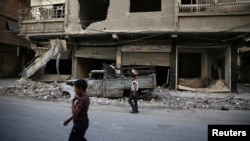
Children walk near damaged buildings in rebel-held Ain Tarma, eastern Damascus suburb of Ghouta, Syria
U.S. Secretary of State John Kerry on Sunday blamed Syrian President Bashar al-Assad's government for blocking aid deliveries and said Russia must do more to put pressure on him. "So let me just say this clearly: Russia signed up to a cessation of hostilities. Assad said he would live by it," Kerry said. "Then he needs to stop and let the joint implementation center get set up so Russia and the United States can coordinate in order to avoid the kind of terrible thing that happened yesterday that we all acknowledge and regret." The U.S. military said it may have unintentionally hit the Syrian soldiers while targeting Islamic State fighters in eastern Syria.
The Russian Defense Ministry said U.S. jets killed more than 60 Syrian soldiers in the city of Deir al-Zor in four air strikes by two F16 and two A10 fighter jets coming from the direction of Iraq. Moscow called for an emergency meeting of the U.N. Security Council to address the strikes. U.S. Ambassador Samantha Power said Moscow's request for the special meeting was a "stunt," while her Russian counterpart Vitaly Churkin accused the U.S. of violating agreements that it would not target army positions. Churkin called the strike a "bad omen" for the U.S.-Russia deal to halt Syria's war, which has killed hundreds of thousands of people since it erupted in 2011.
UN 'Pained and Disappointed' at Lack of Syria Aid Deliveries
See also:
75,000 Syrian refugees trapped on Syria-Jordan border with no aid
Sept. 17, 2016 -- Jordan's refusal to admit Syrian refugees near Rukban, along its northeast border with Syria, has left 75,000 people stranded in the desert cut off from humanitarian aid, said Amnesty International.
The makeshift camp, known as the berm, has grown from 368 shelters a year ago to 8,295 as of September, the humanitarian aid group said. Thousands of people continue to escape the conflict in Syria, only to be turned away at the Jordan border due to "security concerns." "The security of Jordanian people supersedes any other concern," said Mohammed al-Momani, Jordan's government representative.
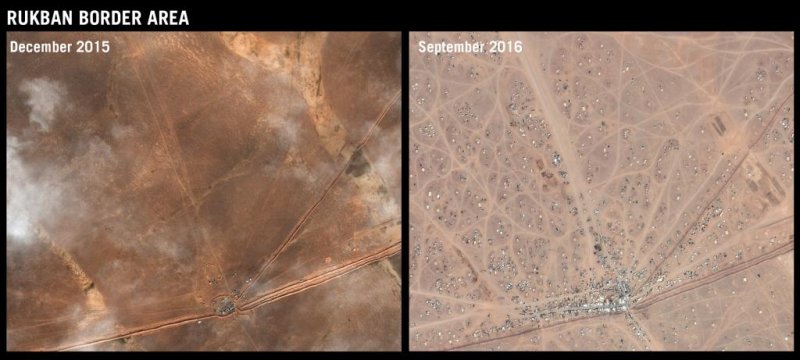
Jordan said it is currently home to more than 1 million Syrians, nearly three-quarters of whom are officially registered with the United Nations. Humanitarian aid to the berm ceased after the border crossings were sealed in June following a deadly attack that killed seven Jordanian border guards.
Amnesty reports only one food delivery was made to the region in early August and the lack of adequate medical care has seen a sharp rise in hepatitis, "which is believed to be the leading cause of child deaths in Rukban." There have also been reports of several childbirth-related deaths as a large number of pregnant women are among those fleeing the turmoil in Syria. Exact figures have been difficult to obtain due to lack of access to the berm, Amnesty said.
75,000 Syrian refugees trapped on Syria-Jordan border with no aid
StLucieBengal
Gold Member
Aid not gettin' through...

UN 'Pained and Disappointed' at Lack of Syria Aid Deliveries
September 19, 2016 - The U.N.'s emergency relief coordinator said Monday he is "pained and disappointed" that convoys have yet to be allowed into Aleppo where as many as 275,000 people are in need of food, water and medical aid.
Humanitarian deliveries to Aleppo were one prong of a cease-fire deal reached between the United States and Russia that was due to end late Sunday. There was no official declaration of its fate by early Monday, but with deadly airstrikes on rebel positions in Aleppo Sunday and one by the U.S.-led coalition Saturday that killed dozens of Syrian soldiers, the pact appeared to be unraveling.
U.N. Under-Secretary-General for Humanitarian Affairs Stephen O'Brien reiterated the world body's demands that it be allowed unimpeded access to deliver supplies and evacuate those in need of critical medical attention. "The people of Syria have suffered long enough. Millions of Syrian civilians continue to face horrific deprivation and violence, especially those trapped in besieged and hard-to-reach areas," O'Brien said in a statement. The U.S. and Russia have influence on the conflict from their support of competing sides, and in recent days tensions between them have risen as the cease-fire appeared shaky.

Children walk near damaged buildings in rebel-held Ain Tarma, eastern Damascus suburb of Ghouta, Syria
U.S. Secretary of State John Kerry on Sunday blamed Syrian President Bashar al-Assad's government for blocking aid deliveries and said Russia must do more to put pressure on him. "So let me just say this clearly: Russia signed up to a cessation of hostilities. Assad said he would live by it," Kerry said. "Then he needs to stop and let the joint implementation center get set up so Russia and the United States can coordinate in order to avoid the kind of terrible thing that happened yesterday that we all acknowledge and regret." The U.S. military said it may have unintentionally hit the Syrian soldiers while targeting Islamic State fighters in eastern Syria.
The Russian Defense Ministry said U.S. jets killed more than 60 Syrian soldiers in the city of Deir al-Zor in four air strikes by two F16 and two A10 fighter jets coming from the direction of Iraq. Moscow called for an emergency meeting of the U.N. Security Council to address the strikes. U.S. Ambassador Samantha Power said Moscow's request for the special meeting was a "stunt," while her Russian counterpart Vitaly Churkin accused the U.S. of violating agreements that it would not target army positions. Churkin called the strike a "bad omen" for the U.S.-Russia deal to halt Syria's war, which has killed hundreds of thousands of people since it erupted in 2011.
UN 'Pained and Disappointed' at Lack of Syria Aid Deliveries
See also:
75,000 Syrian refugees trapped on Syria-Jordan border with no aid
Sept. 17, 2016 -- Jordan's refusal to admit Syrian refugees near Rukban, along its northeast border with Syria, has left 75,000 people stranded in the desert cut off from humanitarian aid, said Amnesty International.
The makeshift camp, known as the berm, has grown from 368 shelters a year ago to 8,295 as of September, the humanitarian aid group said. Thousands of people continue to escape the conflict in Syria, only to be turned away at the Jordan border due to "security concerns." "The security of Jordanian people supersedes any other concern," said Mohammed al-Momani, Jordan's government representative.

Jordan said it is currently home to more than 1 million Syrians, nearly three-quarters of whom are officially registered with the United Nations. Humanitarian aid to the berm ceased after the border crossings were sealed in June following a deadly attack that killed seven Jordanian border guards.
Amnesty reports only one food delivery was made to the region in early August and the lack of adequate medical care has seen a sharp rise in hepatitis, "which is believed to be the leading cause of child deaths in Rukban." There have also been reports of several childbirth-related deaths as a large number of pregnant women are among those fleeing the turmoil in Syria. Exact figures have been difficult to obtain due to lack of access to the berm, Amnesty said.
75,000 Syrian refugees trapped on Syria-Jordan border with no aid
Sounds like a Middle East issue that should be sorted out by members of the Middle East.
Close borders to refugees and send them all home. The only legitimate "refugees" from Syria anyway are the Christians. They are the ones in real trouble.
StLucieBengal
Gold Member
course I don't want any , its pretty easy to say that you are a Christian and carry a Rosary . Best thing is to feed them in safe zone in their world , give them gun , weapons and training .
Could always set up a Buffet of bacon and non-halaal meats and see who refuses to eat.
China gonna provide additional refugee humanitarian aid...

China pledges additional US$100 million humanitarian aid for refugees
Tuesday 20th September, 2016: China plans to provide an additional US$100 million (76.68 million pounds) in assistance to help deal with the global refugee and migrant crisis and is also considering setting aside a US$1 billion fund for the purpose, Chinese Premier Li Keqiang said on Monday.
China pledges additional US$100 million humanitarian aid for refugees
Tuesday 20th September, 2016: China plans to provide an additional US$100 million (76.68 million pounds) in assistance to help deal with the global refugee and migrant crisis and is also considering setting aside a US$1 billion fund for the purpose, Chinese Premier Li Keqiang said on Monday.
Li told a refugee summit at the United Nations that large movements of refugees posed a political, social and security threat that created opportunities for terrorists to exploit. "We are committed to shouldering our responsibilities compatible with our abilities," Li said. "We would like to provide US$100 million of additional humanitarian assistance on top of the previous pledges while considering taking further supportive measures."
Li said China would also "seriously consider" setting aside the China-U.N. Peace and Development Fund to support developing countries in their effort to deal with the problem. He said China would "actively explore" working with international institutions and developing countries. During the annual gathering of world leaders at the United Nations in September last year, China said it would establish a 10-year, US$1 billion fund to support the U.N.'s work.
China took a first step in fulfilling this pledge when it signed an agreement with the United Nations in May to pay US$20 million annually for a decade to help fund peace, security and development. Under the terms of the agreement, the money was to be paid into a newly established U.N. Peace and Development Trust Fund, and China's contribution split evenly between supporting peace and security, and implementing a 2030 agenda for sustainable development.
China pledges additional US$100 million humanitarian aid for refugees
Similar threads
- Replies
- 62
- Views
- 1K
- Replies
- 121
- Views
- 1K
- Replies
- 57
- Views
- 1K
- Replies
- 23
- Views
- 298
Latest Discussions
- Replies
- 53
- Views
- 464
- Replies
- 130
- Views
- 788
Forum List
-
-
-
-
-
Political Satire 8014
-
-
-
-
-
-
-
-
-
-
-
-
-
-
-
-
-
-
-
ObamaCare 781
-
-
-
-
-
-
-
-
-
-
-
Member Usernotes 466
-
-
-
-
-
-
-
-
-
-
